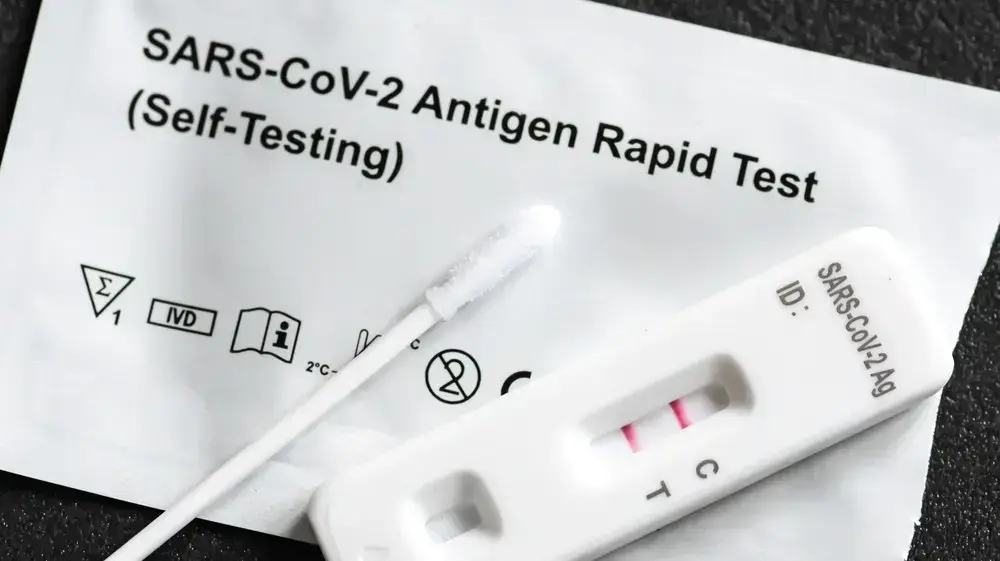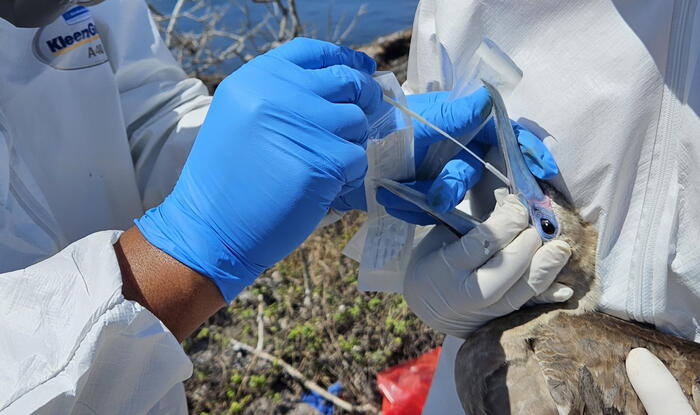Enlarge image
dr Fauci:
"They create lies about me."
Photo:
Jason Andrew / The New York Times / Redux / laif
DER SPIEGEL:
Dr.
Fauci, in your last interview with us in August 2020 you predicted that with an effective vaccine, the pandemic would be over by the end of 2021. What happened?
Fauci:
Well, the virus did what viruses tend to do: It surprised us.
One of the things that was not anticipated was that we would get the Delta variant with a major surge both in effectiveness and in severity.
Then in the US, we've had a lot of push back on people wanting to get vaccinated, so there's always the vulnerable population that allows for the spread of the virus.
It is similar in Germany.
Then we found out that protection from the vaccine diminishes after several months.
So, we started doing boosters.
And just when we got good control of that, along comes Omicron!
DER SPIEGEL:
The new variant which is even more transmissible than Delta.
Fauci:
Yes, it's extraordinary.
But we're starting to see in studies from South Africa, from the United Kingdom and in some recent studies from the United States that the severity of the disease is considerably less with Omicron.
That's the good news.
In the United States the overwhelming proportion of hospitalizations and deaths are among unvaccinated people or vaccinated who have profound immune deficiencies.
The sobering news is that so many people get infected that the sheer volume of cases, even if only a smaller percentage get seriously ill, might be really very challenging to the health care systems.
DER SPIEGEL:
You said this week that nearly everybody will become infected with Omicron.
Are we now witnessing the last steps toward the virus becoming endemic?
Fauci:
Well, you can only make an educated guess. I think we're seeing the evolution into a much more prevalent but less severe infection. At least we hope for this, but there's no guarantee. To get to where we all want to be, which is a level of control so that people will get infected but they'll get a common cold and won't get seriously ill, many people will either have to be vaccinated or have already been infected and recovered, together with an occasional boost. When this is the case, as we go into the next year, we'll start to see cases coming down and hospitalizations going way down. Once we get there, we may be able to look upon this as another respiratory illness that for most of the population is not a problem. I hope we're going in that direction. I think we are, but we can't make the mistake of saying,
"
Oh, this is less severe, we are done with it."
We might be done with it, but there's no guarantee that we are.
DER SPIEGEL:
Will there be other variants after Omicron?
Fauci:
Given the fact that there are so many countries, particularly low- and middle-income countries, where the rate of vaccination is still very low, you are going to see continuing smoldering of infection.
By this we give the virus the opportunity to mutate, and it is conceivable that the next variant will have a high degree of transmissibility but also a high degree of severity.
DER SPIEGEL:
There is the hypothesis that new variants can develop in immunocompromised patients.
You're an HIV expert.
What role do you think do poorly treated HIV infections play in this pandemic?
Fauci:
One of the things we have to be careful of, when you ask a question like that, is not to be blaming HIV-infected individuals. This would be a really bad conclusion. Because it isn't just HIV that compromises the immune response. In fact, it could be an HIV-infected person or it could be somebody on cancer chemotherapy or with an auto immune disease. We know when people do not clear the virus and you allow it to replicate for long periods of time, you give the virus the opportunity to essentially adapt to defending itself against the immune response, because that's what viruses do. So, when that person infects someone else, you already have a virus that has been selected to evade the immune response. So, we have to make absolutely sure that people who are immune compromised get vaccinated,and give them passive transfer of antibodies to protect them from getting infected. We have to make sure all HIV-infected people get access to health care and get treated. If you do that, you will eliminate a lot of the opportunities that the virus has to evolve into a new variant.
DER SPIEGEL:
The German government is against stricter restrictions right now, even though cases are rising steeply.
Do you think this is a mistake?
Fauci:
I don't want to be making any criticism of what an individual country does.
They need to look at what the special circumstances in their own country are.
We have very special circumstances in the United States, we have a tremendous amount of political divisiveness.
So many people do not want to get vaccinated - not for public health reasons, but almost for political ideology.
DER SPIEGEL:
Shortly before Christmas, police arrested a man on his way to Washington, DC He had a semi-automatic rifle in his car, ammunition and a hit list with your name on it.
How could you, a physician and scientist, become the target of such hatred?
Fauci:
There are people who politicize the divisiveness in our country. So, I have become what's called a polarizing figure. And I didn't make myself polarized. The people who are the far extremists have attacked me personally, saying I created the virus, which is completely crazy. They say that I'm trying to take away people's freedom by telling them they should be vaccinated. They say that when I want to get people to wear masks, I'm encroaching upon their personal freedom. So, if you go back to everything I've ever said, it's only been promoting pure public health practices - vaccine, booster, wear a mask, avoid crowded places. Because I've said that I have become the enemy of some people. They create lies about me, and when you say that enough on social media,people who are a little bit crazy feel they've got to get rid of someone who's trying to take away my liberties. So, it is very, very disturbing. When you have a public health challenge, it's time for everyone to pull together against the common enemy. And the common enemy is the virus. The common enemy is not the public health officials who are trying to control the outbreak.
DER SPIEGEL:
In a recent documentary, you said that you had developed post-traumatic stress disorder in your fight against HIV because you weren't making much progress for a long time.
Did the COVID pandemic traumatize you somewhat as well?
Fauci:
When I said in the film that I was post-traumatically stressed, it was because I'm a physician who's taken care of thousands of HIV infected individuals, and in the early years, most of them died no matter what I did.
And when you are trained to be a physician and a healer and all of your patients die, that has a very profound effect on you.
Now, it is more of a frustration.
DER SPIEGEL:
What exactly is that frustration about?
Fauci:
Well, science has given us highly effective vaccines that can protect you, certainly protect you against severe disease. The frustration is about knowing you have the tools to save someone's life. But for political reasons, it's not being implemented, and the people who want to protect you are demonized. That's a different kind of a stress than the stress of trying to save a person's life and not being successful.
DER SPIEGEL:
The last time we interviewed you, we asked if then President Donald Trump was downplaying the pandemic and even giving dangerous advice because he simply doesn't understand science.
In the meantime, in Bob Woodward's book "Rage," Trump admitted to having deliberately lied about the pandemic.
Do you see a correlation between the denial of science and attitudes toward democracy?
Fauci:
I think there is because if you deny science, you deny reality, and a lot of the anti-democratic activities that you're seeing now is people denying reality, like the reality that the president of the United States was duly elected.
Or the reality that it's really bad when you attack the Capitol of the United States of America.
DER SPIEGEL:
Many people think that SARS-CoV-2 might have been created in a lab as a result of gain-of-function experiments that scientists use to study which genetic changes make a pathogen more dangerous. You tested before Congress, under oath, that the National Institutes of Health never funded such gain-of-function research in Wuhan. Later, journalists unearthed a document proving that the NIH actually awarded a grant for a big project, "Understanding the Risk of Bat Coronavirus Emergence," which included experiments with genetically altered bat coronaviruses and mice. How is that not gain-of-function research?
Fauci:
The term "gain of function" is very misleading.
The fact that we make influenza vaccines every year is gain of function, so people throw that around without knowing what it means.
The United States had a three-year project, from 2014 to 2017, of determining what is allowable research and setting the guardrails.
This wasn't determined by me, it was determined by the Office of Science and Technology Policy of the US at the level of the White House.
DER SPIEGEL:
And this grant, awarded to the NGO Eco Health Alliance, fell within the guardrails?
Fauci:
This grant, a very small grant, was given to Eco Health for the surveillance of the bat situation and to determine the ultimate cause of the original SARS.
And they did it with certain technologies that were judged by experienced people to be within the guardrails of allowable research.
It was very good research that actually showed where the original SARS came from.
Some people interpreted that as gain of function research.
So, when I was asked, did we ever fund a grant that was beyond the guardrails of what we should do in Wuhan, the answer was: absolutely not!
DER SPIEGEL:
The debate over gain-of-function research is so charged because of the suspicion that SARS-CoV-2 could have originated in the laboratory.
Fauci:
Anyone who has any experience in evolutionary virology, in viral phylogeny, will know that the viruses that were worked on by the grants that the NIH funded could not, possibly, under any circumstances have evolved into SARS-CoV-2.
DER SPIEGEL:
Would you be open to a debate about setting the guardrails higher?
Fauci:
Well, absolutely!
If the general public wants to reexamine them, I would be more than happy to do so.
DER SPIEGEL:
Looking back at the two years of the pandemic, is there anything you regret?
Or maybe you don't have to look back that far: On Tuesday, during a live Senate hearing, the world could hear you mutter "What a moron" about Republican Senator Roger Marshall.
Apparently, you thought your mic was off.
Fauci:
Well, you know, I'm sorry that I said that, but the senator was accusing me of being in cahoots with pharmaceutical companies in getting inside data so I could pad my portfolio.
He was not realizing that my finances are completely public knowledge to everybody.
I shouldn't have said that, that's not my style.
But it was very frustrating to see a United States senator asking such a ridiculous question.
DER SPIEGEL:
Another Republican Senator attacked you fiercely at the hearing, and a hate campaign is being carried out against you on social media.
Is this your idea of a fulfilling, satisfied work life?
Why not lie on a beach somewhere and enjoy life?
Fauci:
I'm a physician, a scientist, and it is my responsibility as a director of a scientific institution to develop the vaccines and the therapies to prepare us for and respond to outbreaks.
We are in the middle of an historic outbreak, and I haven't had a day off in two years, but that doesn't make any difference.
We've got to end this outbreak.
Then, I'll think about going to a beach, but not right now.
DER SPIEGEL:
Dr.
Fauci, thank you for this interview.









/cloudfront-eu-central-1.images.arcpublishing.com/prisa/MFNU3W6IPNFEZN5AKWTEXVXT6Y.jpg)





